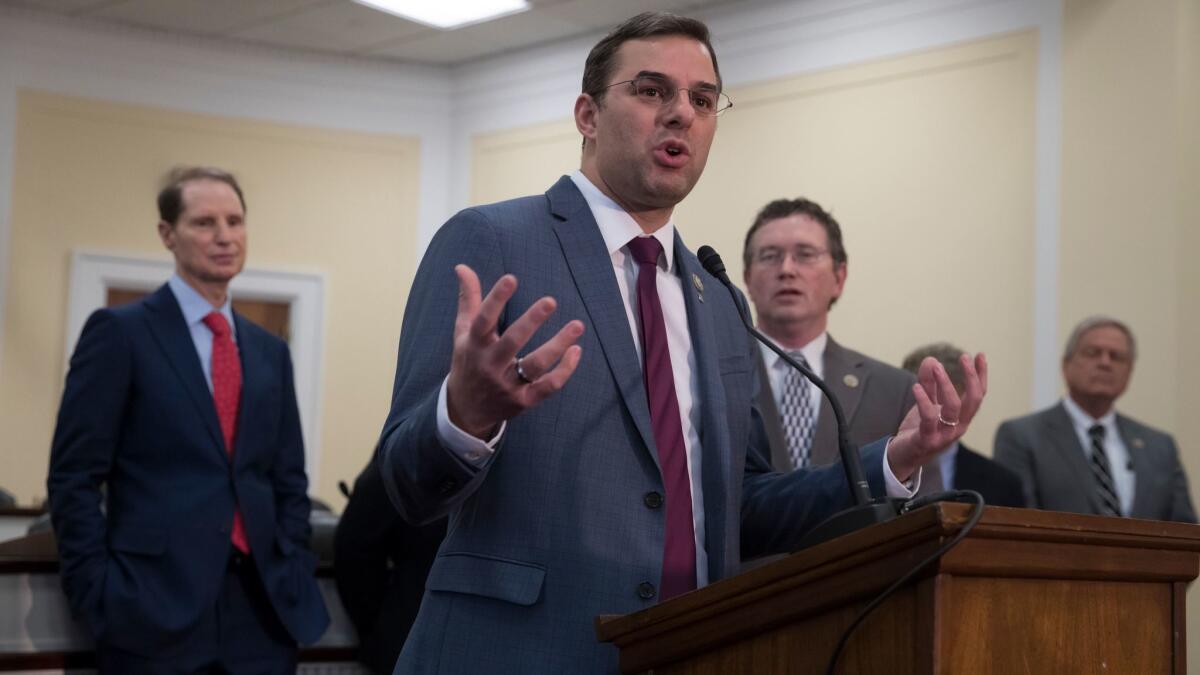Editorial: Put some blinders on the feds’ prying eyes

- Share via
The House faces a crucial choice Thursday over how to extend a program that is credited with disrupting terrorist plots but also has taken a toll on Americans’ privacy.
Lawmakers are expected to vote on competing bills to reauthorize Section 702 of the Foreign Intelligence Surveillance Act. That law enables the National Security Agency to intercept the emails, text messages and other electronic communications of foreigners living abroad, but in the process, the private conversations of Americans at the other end of those communications are scooped up — putting them at risk of criminal prosecution.
Both bills would make it harder for the FBI to engage in “backdoor searches” of Americans’ emails and other communications through foreign intelligence data. Such searches in the absence of a warrant based on probable cause amount to an end run around the 4th Amendment.
Yet civil liberties groups overwhelmingly prefer the version sponsored by Rep. Justin Amash (R-Mich.) over the one offered by Rep. Devin Nunes (R-Tulare), the chairman of the House Intelligence Committee — and for good reasons.
The Amash bill, known as the USA Rights Act, would require investigators to obtain a warrant to search the government’s database of Section 702 data for communications to, from or about an American. The Nunes bill also contains a warrant requirement, but only in connection with an advanced or “predicated” criminal investigation that doesn’t relate to national security. Critics persuasively argue that this would allow the FBI to sift through information about Americans in many other investigations without judicial approval.
Amash’s proposal — which is cosponsored by Rep. Zoe Lofgren (D-San Jose) and 41 other House members — is also more protective of privacy when it comes to the collection of messages from Americans that are neither to or from a foreign target but merely mention a foreigner’s email address or other “identifier.”
The National Security Agency stopped this practice, known as “about collection,” in 2017, because it couldn’t ensure that it could comply with rules set by the Foreign Intelligence Surveillance Court for protecting Americans’ privacy. But the NSA could resume the practice under the Nunes bill if it got the approval of the court and notified Congress. The Amash bill would effectively end it.
The choice made by the House is especially important because authorization for Section 702 expires on Jan. 19. It seems increasingly likely that the Senate will accept language approved by the House rather than develop its own version to send to a conference committee.
Section 702 has been useful in detecting and disrupting terrorist plots. But in extending it, Congress should align it more closely with the Constitution.
Follow the Opinion section on Twitter @latimesopinion and Facebook.
More to Read
A cure for the common opinion
Get thought-provoking perspectives with our weekly newsletter.
You may occasionally receive promotional content from the Los Angeles Times.









